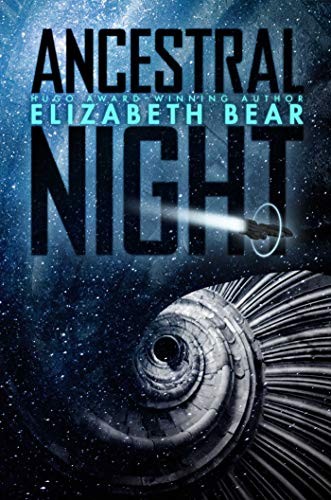Dee 📖 (book aspect) (e)k Elizabeth Bear (duplicate)(r)en Ancestral Night liburuaren kritika egin du
An enjoyable space opera
4 izar
Ancestral Night is a space opera, of the sort that features a crew of a small starship getting into some adventures in a universe of interesting aliens and colorful characters.
The book is written from the perspective of its protagonist, in a generally lighter tone, which works well for that character. The overall arc of the plot also does not get too dark—Ancestral Night belongs to the subgenre of space opera that features universes which, while perhaps not entirely utopian, are generally not unpleasant places to hypothetically exist in. The plot, nevertheless, involves the old favorites such as ancient mysteries of the universe and space pirates, which Elizabeth Bear utilizes to generally good effect in crafting a space adventure.
The novel is not just pulp, however. An underlying plot concerns the questions of individual autonomy versus collectivism, and the use of transhumanism to better societies as a whole. The …
Ancestral Night is a space opera, of the sort that features a crew of a small starship getting into some adventures in a universe of interesting aliens and colorful characters.
The book is written from the perspective of its protagonist, in a generally lighter tone, which works well for that character. The overall arc of the plot also does not get too dark—Ancestral Night belongs to the subgenre of space opera that features universes which, while perhaps not entirely utopian, are generally not unpleasant places to hypothetically exist in. The plot, nevertheless, involves the old favorites such as ancient mysteries of the universe and space pirates, which Elizabeth Bear utilizes to generally good effect in crafting a space adventure.
The novel is not just pulp, however. An underlying plot concerns the questions of individual autonomy versus collectivism, and the use of transhumanism to better societies as a whole. The protagonist, like many people in her world, uses cybernetic modifications to control her emotions and mental state, a practice which on a larger scale is used to keep the whole of Synarche—the society within which the protagonist lives—functioning. At times she comes to question whether such practices are wise, or at least if the extent to which they are employed is not too great. The one shortcoming of the novel is that while it hints at such ideological conflicts exist, the characters which stand opposed to the Synarche seem to be driven more by being antisocial, rather than any cohesive alternative ideology, serving mostly as foils to make the protagonist think about things.
Besides being an exploration of transhumanist emotional editing at a societal scale, the novel is an exploration of the same at an individual scale. We see the protagonist deal with her trauma, and deal with the fact that she has been dealing with her trauma through brain implants. Bear does not go with the usual cliches in exploring this, but rather allows us to see the protagonists experiences from her own perspective. Character-focused science fiction about personal experiences is another thing that the novel does well.
Overall, the book will probably be an entertaining read if space adventure stories featuring elements such space tugs with witty AIs, space pirates, and space cats living in free fall are something that appeals to you.

